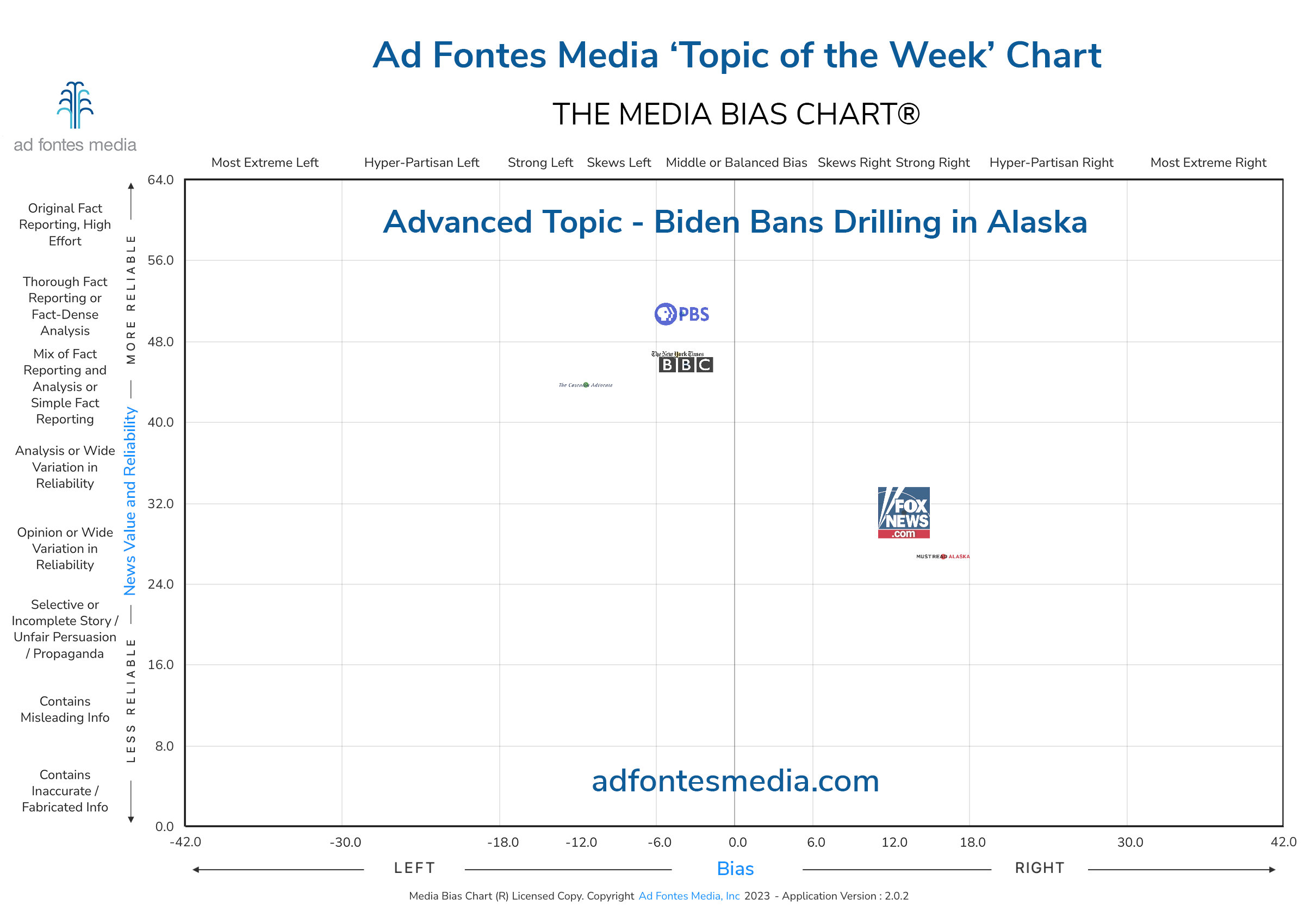Menu

News Coverage of Biden Banning Drilling in Alaska
Ad Fontes Media explains the bias and reliability ratings for this week’s Topic of the Week.
Author:
Sara Webb
Date:
09/15/2023
Each week, Ad Fontes Media chooses a widely covered trending news topic to share insight into how our analysts rank news coverage for the Media Bias Chart®. This week we looked at coverage of President Biden canceling the remaining leases for oil and gas drilling in the Alaskan wilderness.
To do this, we select six articles reporting on the same story from different outlets to show how each treated the subject differently. Once we choose a set of articles, pods of analysts with diverse political perspectives (one right leaning, one center, and one left leaning) read each article and use Ad Fontes Media’s content analysis methodology to determine its bias and reliability. These ratings inform the articles’ placement on that week’s special Media Bias Chart.
The articles that our analysts rated as having “middle or balanced” coverage of the issue (a bias between -6 and +6 on the Media Bias Chart) included coverage from PBS (“Biden cancels last oil and gas leases in Alaska’s Arctic Refuge, overturns sales held by Trump”), which scored a -4 for bias and a 50 for reliability; from the BBC (“Biden cancels Trump drilling leases in Alaska’s largest wildlife refuge”), which scored a -3 for bias and a 45 for reliability; and The New York Times (“Biden Administration to Bar Drilling on Millions of Acres in Alaska”), which scored a -4 for bias and a 46 for reliability. Since these are pretty tame in their scores, we’re going to skip them for the purposes of this week’s blog. You can always read each article and compare how your scores add up against those of our analysts!
The more biased articles came from The Cascadia Advocate (“A reprieve for the Arctic Refuge: President Biden acts to protect lives and land alike”), which scored a -11 for bias and a 43 for reliability; Fox News (“Manchin, others torch Biden for banning oil drilling across millions of acres: ‘assault on our economy‘”), which scored a 13 for bias and a 31 for reliability; and Must Read Alaska (“Nick Begich blasts Biden, Peltola for ‘economic terrorism’ over oil and gas”), which scored a 16 for bias and a 26 for reliability. We will look at the two local news sources more in depth.
The Cascadia Advocate is a publication of the Northwest Progressive Institute, a liberal think tank based in Washington state that publishes stories about and located in the Pacific Northwest. Their FAQ page has some really interesting stuff, including why their stories seem opinionated (“Because they are!”) and explains that their articles are subjective, that there is bias inherent in writing, and that since their perspectives are interwoven with their research, they call their brand of news “advocacy journalism.”
Take a read and see if you agree. Our analysts did: their scores put it in the “skews left” category for bias and a “mix of fact reporting and analysis” for reliability, noting that it “includes key facts, a survey of opinions, and a pretty close quick look for readers into the area and people most impacted.” Or, and a touch more romantically, it “poses the environmentalist position on the topic, from an actor POV.”
Must Read Alaska does not have an FAQ or an About page; the blurb at the bottom of the main page states that it “is news of people, politics, policy, culture, and happenings in Alaska. It is edited by Suzanne Downing, who first landed in Alaska in 1969, and has called it home ever since.” There is not a lot of information about the publication, but Suzanne Downing is the communications director of the Alaska Republican Party. This article is interesting and demonstrates why we like to examine local news sources as well as national ones, because local news gives us the take of the people who live near where the news is actually happening.
This article is from the point of view of Nick Begich, a Republican who is running for election to the U.S. House to represent Alaska’s At-Large Congressional District, and it is his quip of “economic terrorism” that made it into the headline. After reading the article, it is clear that Begich is deeply concerned about the economic impact that the lease cancellations could have on the people he hopes to represent. Conversely, as a local publication, it lacks the larger context that so many of us have grown to expect in our news consumption.
What do you think? Is local better, or do you like the context provided in many national sources? I prefer a mix of the two, and often for the reason that national news rarely covers the stories that are part of my everyday life, unless it happens to be about a convicted murderer who escaped prison and is running through the woods a little too close to your home for comfort. Then there is news everywhere.
Be sure to check in next week for another exciting episode of Topic of the Week!
If you want to stay informed on all of the work by our amazing staff, join our mailing list!


